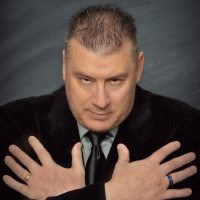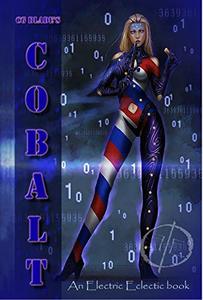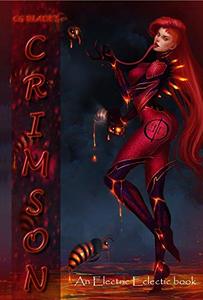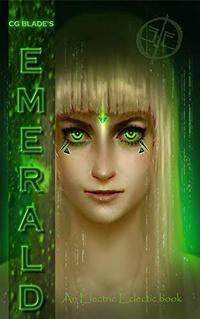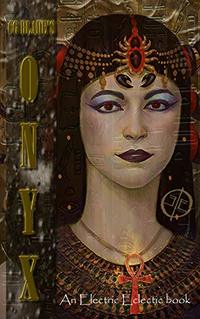Genre:
Thriller Action & Adventure Science Fiction Horror- Country: United States
- Books: 4
- Profession: Author
- Born: 10 October
- Member Since: Dec 2015
- Profile Views: 50,362
- Followers: 62
- VISIT AUTHOR: Website, Facebook, Twitter, Instagram, Goodreads, Amazon, YouTube, Pinterest, Linkedin,
CG Blade - Kitchen Sink Conspiracy, Historical Science Fiction, Genetic Engineering, Horror, Sci-Fi, Terror, and Automata Suspense Author.
Welcome to the Pseudoverse where engineers and scientists bring artificial intelligence and robotic programming to life with the occult and other codices. The main characters such as wounded warriors, police officers, detectives, reporters, aliens, witches, genetic scientists, and mad geniuses become Artificial Intelligence and Robotic badasses saving humanity from external threats and its own bad decisions. Do you love a grand conspiracy wi... thin our own "Deep State" of government? Come along and take a wild ride with all of the experiments that go "bump-in-the-night."
You will be glad you dove into this continuing saga!
On the following colorful pages, you will find the exciting genres, and sub-genres of Conspiracy Kitchen Sink, Pulp Fiction, Historical Science Fiction, Genetic Engineering, A.I., Pop Culture, Music, Magic, Fantasy, Witchcraft, Robotics, Horror, Sex, Romance, Mystery, and Noir Crime.
A little bit about CG Blade and his backstory...
"Great novels comfort the disturbed, and disturb the comfortable."
Soaking up every English class in two colleges, he remained steadfast to writing the Pseudoverse Series for the past twenty years. Readers are very familiar with the "jaw-dropping, neck-snapping plot twists" in the Pseudoverse Series of novels. Lightning strikes CG Blade's powerful creative side regularly, as he never stops writing between novels. The Pseudoverse novels are a “mash-up” of historical fiction, science fiction, horror, and plenty of dark humor and sarcasm. A love of the series "Fringe," "Universal and Hammer Sci-Fi/Horror" films, and the great minds of authors such as Huxley, Orwell, Dick, Lovecraft, Nelson, Bradbury, Heinlein, Wells, and many others, are the foundation for CG’s writing. CG Blade’s style and technique is a derivative all his own turned upside-down as he takes you through a world of New Order using technology as the ultimate master race.
Author, creative writer, Transhumanist, Pseudosynth, and former robotic engineer and programmer, CG is an avid science fiction reader and lover of twisting, ever-turning plots. Taking the reader down many thrilling cyber roads and mysterious paths, his narratives rely heavily on past and present scientific, historical research, and the human condition. Melding the past, present, and future, these stories are carefully mixed and stirred with music lyrics, real people, historical fiction, and the potential of artificial intelligence run amok. Fused with satirical commentary and the first musical “Grindhouse” intermissions in novels (Including poetry), he continues his fiction writing with Amaranth, Gold, Amber, Copper, Radium, and Turquoise, and Granite. He currently lives in Ohio with his wife Jackie, and their two rambunctious but lovable cats, Jeri Boo, and Bullet.
"Science fiction's message should be subtle. Like a robotic finger pushing through your skull, poking around, waking you up." CG Blade
Pseudosynth Press
"The Pseudoverse Series has everything you love in one set of fantastic novels! These are the most gripping, twisting, turning, and well-written series of futuristic historical fiction novels you will ever lay your hands on. You will be asking yourself, "why didn't I come across these sooner?" The cliffhangers from novel to novel suck you in like no other series you have read in a long time. Kudos to CG, and his extensive research into all things scary, including "politics by mind-control."" - Karen S. - Amazon Review
read more
CG Blade's Books
Stay in the loop on books by CG Blade. See upcoming and best-selling books by the author here. You'll also find the deals on books by CG Blade.
** Please note that the information or price displayed here may not be the updated. Make sure to double-check the latest book price before buying books.
** Also, there might be other books by CG Blade not listed on AllAuthor.
| Book |
|---|
Cobalt: The First Novel In The Pseudoverse (Pseudoverse Series Book 1)by CG BladePublish: May 03, 2018Series: Pseudoverse SeriesHistorical Mystery Thriller Suspense Mystery Action & Adventure Historical Fiction Science Fiction Fantasy Horror more» |
Crimson: The Second Novel In The Pseudoverse (Pseudoverse Series Book 2)by CG BladePublish: May 07, 2018Series: Pseudoverse SeriesHistorical Mystery Thriller Suspense Mystery Historical Fiction Science Fiction Fantasy Horror more» |
Emerald: The Third Novel In The Pseudoverse (Pseudoverse Series Book 3)by CG BladePublish: May 10, 2018Series: Pseudoverse SeriesHistorical Mystery Thriller Suspense Action & Adventure Historical Fiction Science Fiction Fantasy Horror more» |
Onyx: The Fourth Novel In The Pseudoverse (Pseudoverse Series Book 4)by CG BladePublish: May 13, 2018Series: Pseudoverse SeriesHistorical Mystery Thriller Suspense Mystery Supernatural Suspense Action & Adventure Historical Fiction Humor Science Fiction Fantasy Horror more» |
CG Blade Interview On 20, Feb 2017
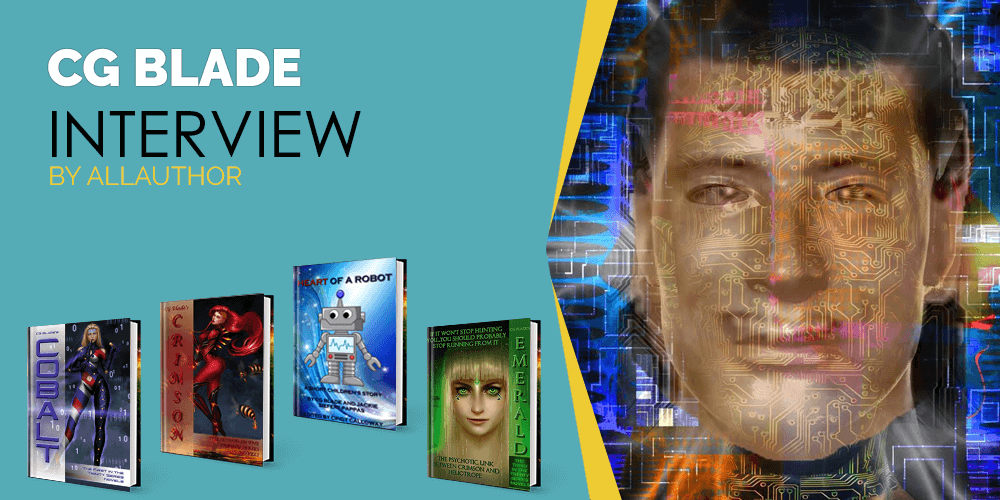 "Writer, veteran and sci-fi enthusiast, C.G. Blade found a way to weave his own life experiences and struggles into his (“sarcastic, futuristic and psychotic”) novels, thus reaching out to so many who battle disabilities silently every day and survive. By connecting to the public, he also found catharsis in his writing. His childhood fascination with the science fiction genre, career background as a robotic programmer and engineer, and his time in the Navy has brought him to where he is today: happy, successful, doing what he loves and surrounded by people who love him.
"Writer, veteran and sci-fi enthusiast, C.G. Blade found a way to weave his own life experiences and struggles into his (“sarcastic, futuristic and psychotic”) novels, thus reaching out to so many who battle disabilities silently every day and survive. By connecting to the public, he also found catharsis in his writing. His childhood fascination with the science fiction genre, career background as a robotic programmer and engineer, and his time in the Navy has brought him to where he is today: happy, successful, doing what he loves and surrounded by people who love him.Every day is a trial when you’re living with chronic pain which stems and ebbs at will, and yet Blade successfully overcomes these daily obstacles with his military-trained discipline and drive. He believes in writing using life’s trials and tribulations as inspiration, which can be felt in the stories of his books and the personalities of his characters.
A patriotic soul at heart with an abundant love for the sci-fi, this fan of Ray Bradbury and Robert Heinlein couldn’t be more grateful to be accepted by his fellow genre lovers and to work with AllAuthor across social media platforms on a journey to reach out to the masses."
I dreamt of being a writer since I was a child. I have always been a big fan of Philip K. Dick, Ray Bradbury, Robert Heinlein, and the list goes on… The possibilities of science fiction and the incredible twists and turns inside the books always made me admire how they were written. Watching and reading science fiction as a teenager through my adult years fueled my efforts to write my own series. The very first movie I ever saw was the Hammer (Bray) Studios production of ‘Five Million Years to Earth’ (Quartermass and the Pit). I was so enamored with this film and it started my sci-fi train rolling. I grabbed every fiction book I could get my hands on and never stopped reading. I swore to myself if I ever began writing, I would make it a science-fiction story that I would have loved to read. It means so much to me that I was able to see this dream through and that lovers of the genre are very accepting of this series.
How do you think your background as an engineer and robot programmer affects your work as a writer?It has helped immensely as the ‘factual basis’ surrounding most of the technical capabilities of a virtual world, the memory involved, and the jargon used in these books. Growing up learning electricity and electronics at a young age only propelled me into a more wondrous world. I try to use my expertise to solidify the fact that some of these technical things we are seeing now could be used in the future for good, or evil, purposes.
How has your disability helped you accomplish your dreams?That is a great question, only because if it were not for having so many back surgeries this series may never have been written. So, it has been a bittersweet ride. Cobalt was written as a culmination of not being able to regenerate my own vertebrae, and the pain involved with so many surgeries. I twisted this into a historical mind-control conspiracy (MKULTRA, HAARP) from the 1960’s thrust forward into 2076. If I had not started writing, I would have probably gone crazy by now. Writing to me is now cathartic. It is how I relieve my pain and take my mind off my situation. “Making lemonade out of lemons” is exactly how I like to phrase it. Some of the characters in my novels are my pain. You can definitely tell which ones those are in my writing.
Do you believe that your disability has helped you develop as an author?Absolutely. It has given me the time to do the proper research for a novel, develop a writing style, and a daily timeframe of editing. I have found the necessary writing workload can be adjusted according to how I feel on a daily basis. There are days I do not write at all. Other days when I feel better I write like a fiend. For me it is feast or famine. I write in blocks depending on how much pain I am in at the time.
How has your life changed after serving for the Navy?I became more disciplined and driven. Pursuing an engineering career in programming and robotics after the Navy was easier due to the fact that so many companies were looking for Veterans with my background. The military also instills into you the necessary tools for navigating through life. I am a very patriotic person and it shows in Petra, a character in Cobalt. Terprise, another character in the novel, was taken from the ship I was on, the Enterprise. I dropped the ‘En’ in the book as a nod to Eric North, a science fiction writer from the early days of the genre. Eric North was a penname for Bernard Cronin, who wrote The Ant Men and many other books.
How has your Navy experience changed your approach to writing?I use some of my military experience in my writing and you could even call my books military based but I do not market them as such. To me, they are more science fiction and genetics mixed with horror. Just the mere fact that I experienced the military helps me to be more factual in my writing. You have a feel for the way things work from an insider’s perspective. I do not write Tom Clancy novels that are military through and through. I use the military as a foundation for the novels. The funniest thing about my novels is that most of them are based on Army facts and do not even revolve around the Navy. I started a character in the Army, PKD, and just let her continue on from there.
What would you label as your muse, if not inspiration, behind your work?I have two muses. One is my lovely wife Jackie, who is a character in my books, and the other is my editor, Cindy Calloway, also a character in Emerald. I run my writing past my wife, read it to her, and she will give me a thumbs up or a “that may need to be rewritten” look. As far as the technical aspect of things, my editor Cindy is my go-to muse. Besides being an editor, she is a chemist and a biologist. This works out very well with the technical aspect of my writing. Cindy will suggest other ideas or thoughts on my work. Both of them are crucial to my writing throughout its inception, development, and completion.
What do you do to cope with writer’s block?I use flow charts and graphs to lay out a story ahead of time. Without them I would be lost. I have never really experienced writers block. I learned early on that so-called ‘writers block’ is actually caused by an author who does not have the story or characters laid out well enough to continue. I always write the end of the story first. The remainder of the story normally fills itself in as I finish the plotting the narrative.
Have you ever thought of bringing your world of sci-fi adventure and the life of a veteran together in your work?Yes, I use it in my writing although I do not use the Navy as much as I use facts from the Army. I do not think I will ever write about myself or a real life situation, but I do meld the two of them together.
What inspired you to write your first piece of work?The entire idea for the Trinity Series came to me as I lie in bed one night staring at the ceiling after a back surgery wondering, “Why can’t I regenerate”. Why can’t I get better? What if humans had the ability to regenerate their own cells though a binary process? What would the downfalls be? Now mix that with robotics, MKULTRA, politics, a beautiful heroine, and wow I couldn’t get it out of my head. It was fresh and new. Petra is all me in this book. She is everything that is good in my life. She is honest, patriotic, and logical. There is also another character in Cobalt that is my ugly painful side and many people have told me that it fits my chronic pain to a ‘T’. I only wrote this character on my bad days and it reflects nicely throughout the novel. Using your life experiences as a tool in your writing is very helpful.
How would you describe your journey as an author over the years?It is all ups and no downs. There is no down side to writing and publishing a novel. It is work. It is a lot of very hard work and it is not for everyone. But if it is your dream to be an author I would tell you not to wait. I have learned a lot about myself by writing. You need to have three things to publish a book: patience, gratitude, and perseverance. You need to be patient with yourself, give yourself a break and don’t beat yourself up. No one started out at the top, no one. Say thank you often to those who help you along the way. Lastly, never give up―ever. Do not let anyone tell you that you cannot become an author.
Why did you take up writing after your disability?I wanted to tell the story of my pain in a way that was sarcastic, futuristic, and psychotic. I think those are the three ‘tic’s’ I use the most. Letting other pain sufferers know that they are not alone was first and foremost. These novels ‘regenerate’ you from the inside out. There is a reason why they are written the way they are from a genetic modification standpoint. The feeling of being isolated, trapped, and alone is a foregone conclusion in these novels. People who know me personally know “I write what I know”.
Has your family been supportive of your work and aspirations?At least 110% if not more. They have been by my side through the entire process and did a lot of beta reading for me early on. Financially and emotionally they have been through it all with me and I am thankful they were along for the ride. They have become characters in my novels along with others who have supported me.
Lastly, how do you promote your books normally? Has AllAuthor benefited you in any way? And would you recommend this platform to your other author friends?The obvious first choice for any author or reader is social media and All Author fits right in. The website is easy to navigate, beautifully laid out, and allows an author the freedom to do just about anything they need. The use of cross-platforms for novels is a must nowadays. You can promote your books from any different site all at one spot. The Auto-Tweets are an exceptional part of the website and the ability to upgrade your account at any time lets you plan for future promoting. Mady has been a pleasure to work with. I say this because he gives the site a personal touch and has always responded in kind whenever I needed help or had a question. He treats his authors and readers with respect and dignity, which is hard to come by in today’s fast-paced world of binary fly-by media.
Ask CG Blade a Question
Have brimming questions to ask author CG Blade? Ask whatever you like, but keep it appropriate.
** Please note that unanswered questions will not appear on the page. Refrain from posting promotional messages.
